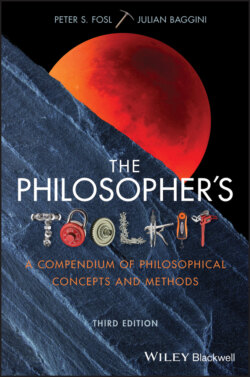Читать книгу The Philosopher's Toolkit - Julian Baggini, Julian Baggini - Страница 49
Consistency ≠ truth
ОглавлениеBe this as it may, inconsistency in philosophy is generally a serious vice. Does it follow from this that consistency is philosophy’s highest virtue? Not quite. Consistency is only a minimal condition of acceptability for a philosophical position. Since it’s often the case that one can hold a consistent theory that is inconsistent with another, equally consistent theory, the internal consistency of any particular theory is no guarantee of its truth. Indeed, as French philosopher‐physicist Pierre Maurice Marie Duhem (1861–1916) and the American philosopher Willard Van Orman Quine (1908–2000) have separately maintained, it may be possible to develop two or more theories that are (1) internally consistent, yet (2) inconsistent with each other, and also (3) perfectly consistent with all the data we can possibly muster to determine the truth or falsehood of the theories (7.11).
Take as an example the so‐called problem of evil. How do we solve the puzzle that God is supposed to be good but that there is also awful suffering (an apparent evil) in the world? As it turns out, you can advance a number of theories that may solve the puzzle but remain inconsistent with one another. You can hold, for instance, that God does not exist. Or you can hold that God allows suffering for a greater good. Although each solution may be perfectly consistent with itself, they can’t both be right, as they are inconsistent with each other. One theory asserts God’s existence, and the other denies it. Establishing the consistency of a position, therefore, may advance and clarify philosophical thought, but it probably won’t settle the issue at hand. We often need to appeal to more than consistency if we are to decide between competing positions. How we do this is a complex and controversial subject of its own.
